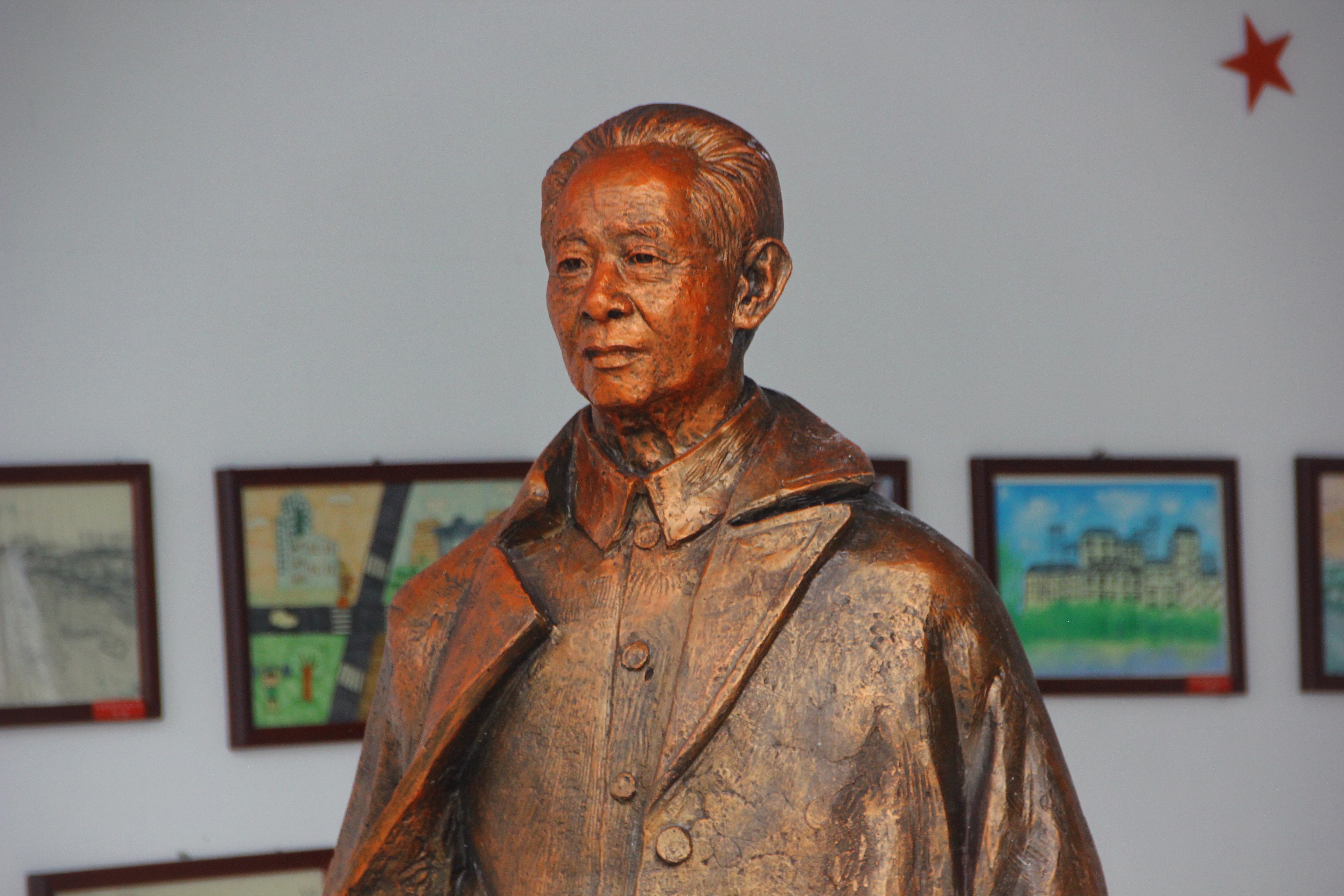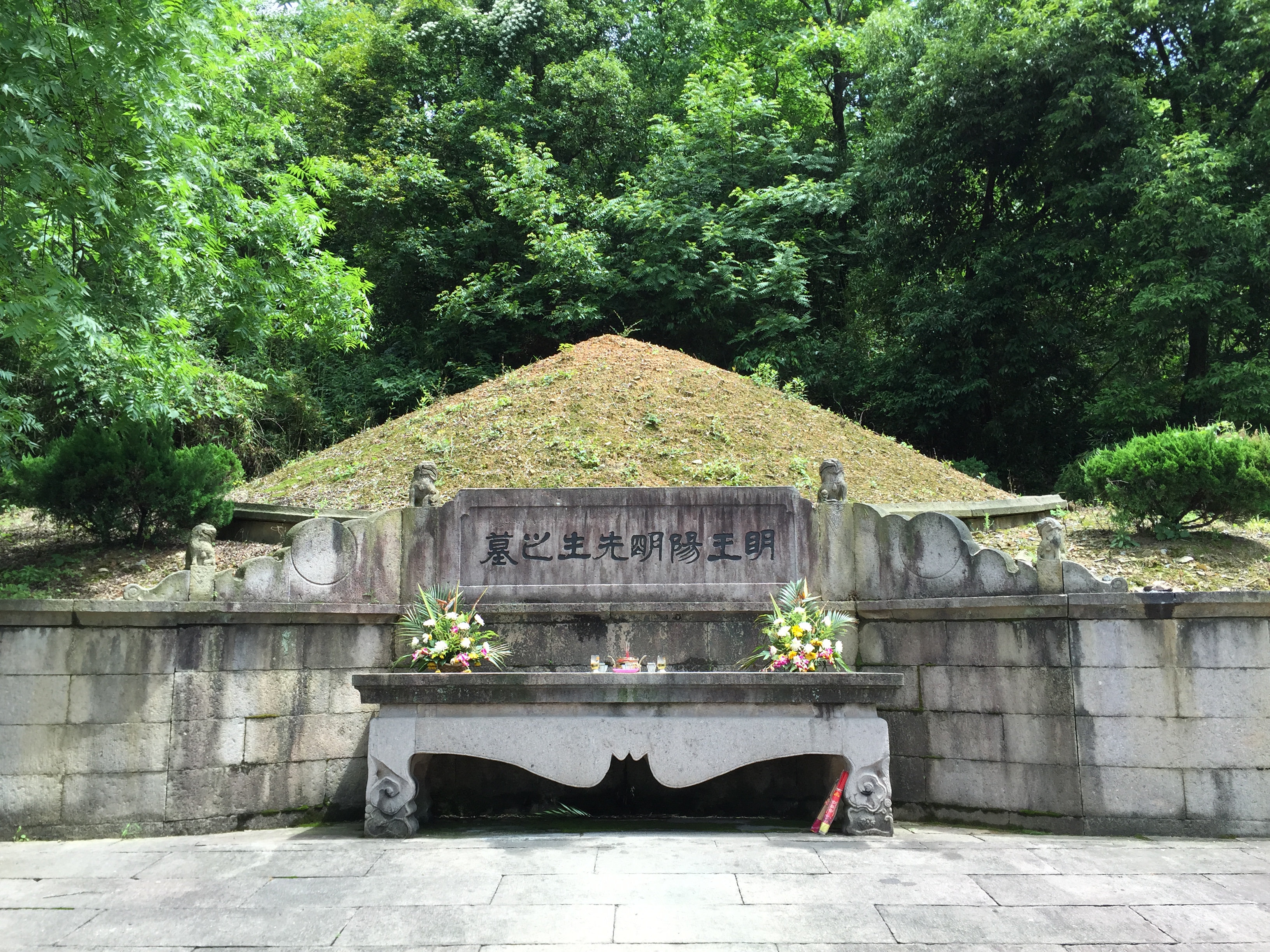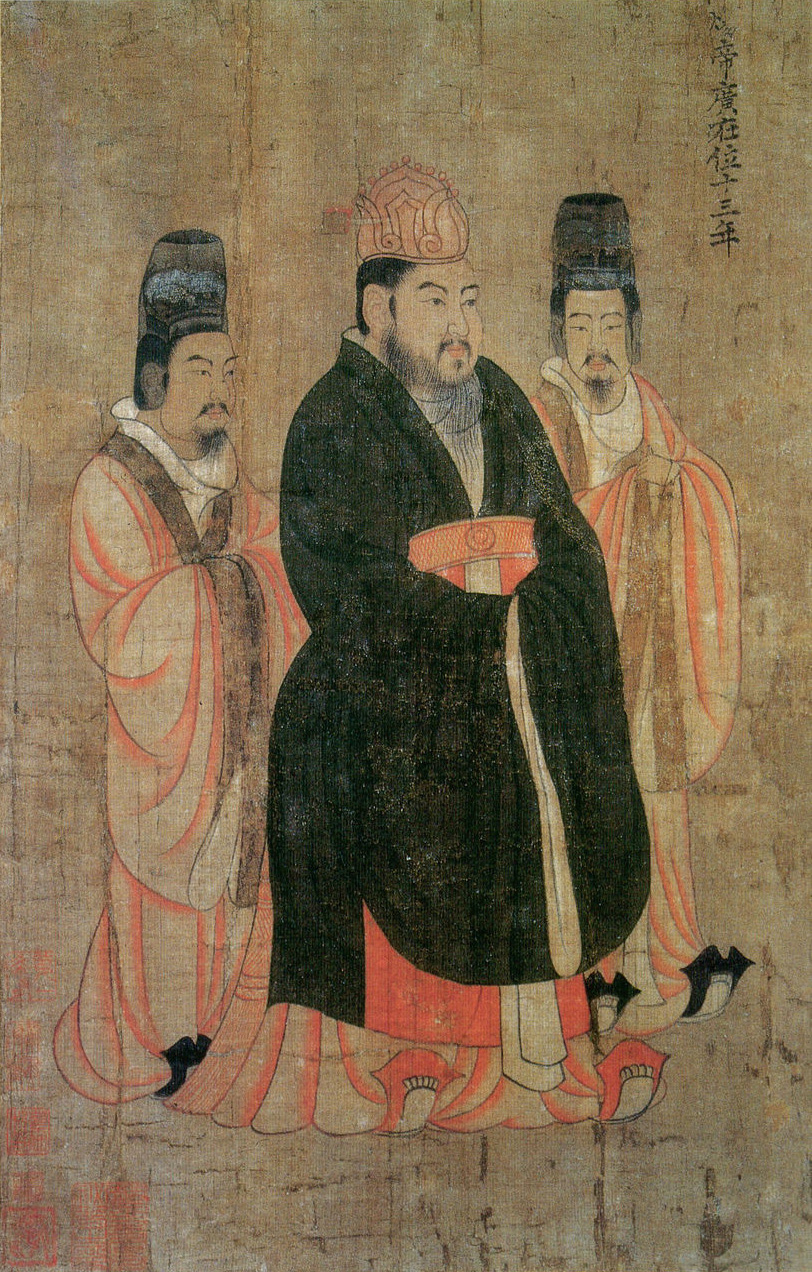|
Wang Tong (philosopher)
Wang Tong (王通; 584–617), style name Zhongyan (仲淹), posthumous name Master Wenzhong (文中子) was a Chinese philosopher and politician during the Sui dynasty. Life Wang Tong was born in Longmen County (modern day Tonghua Township, Wanrong County, Shanxi province) in 587. Wang Tong was a great student and somewhat of a child prodigy, with legend saying he starting teaching at the age of 15. In 602, he received political office and was made Secretary of Shuzhou. In the year 603, he submitted a memorial to Emperor Wen of the Sui dynasty entitled the "12 Point Plan for Great Peace", advocating for an overhaul of the political system. When his proposals were rejected, Wang Tong lost confidence in the Sui court and resigned his post. Leaving Chang'an, he retired to the Hefen region and dedicated himself fully to teaching. During this time, he also wrote numerous works on Confucian philosophy. His most famous (and only surviving) work is the philosophical treatise ''Zho ... [...More Info...] [...Related Items...] OR: [Wikipedia] [Google] [Baidu] |
Four Paragons Of The Early Tang
According to a Tang biography of Yang Dong, the four people enjoyed same popularity and fame in China. They thrived in the time of Emperor Gaozong. The Four Eminences abolished the Gongti Style which had been used since the Southern Qi and Liang dynasty. The Wǔyán Lǜshī (Chinese: 五言律詩) passed through a critical phase of development under the four people's influence. The rank of the Four Eminences has been the spotlight of discussion. Yang Jiong expressed his unwillingness to be put behind Wang Bo and in front of Lu Zhaolin.《舊唐書·楊炯詩; 旧唐书·杨炯诗》 See also *Tang poetry *Classical Chinese poetry Classical Chinese poetry is traditional Chinese poetry written in Classical Chinese and typified by certain traditional forms, or modes; traditional genres; and connections with particular historical periods, such as the poetry of the Tang dy ... References Tang dynasty poets 7th-century Chinese poets Groups of Chinese people Quartets ... [...More Info...] [...Related Items...] OR: [Wikipedia] [Google] [Baidu] |
Chinese Economic Reform
Reform and opening-up ( zh, s=改革开放, p=Gǎigé kāifàng), also known as the Chinese economic reform or Chinese economic miracle, refers to a variety of economic reforms termed socialism with Chinese characteristics and socialist market economy in the People's Republic of China (PRC) that began in the late 20th century, after Mao Zedong's death in 1976. Guided by Deng Xiaoping, who is often credited as the "General Architect", the reforms were launched by reformists within the ruling Chinese Communist Party (CCP) on December 18, 1978, during the '' Boluan Fanzheng'' period. A parallel set of political reforms were launched by Deng and his allies in the 1980s, but eventually ended in 1989 due to the crackdown on the Tiananmen Square protests, halting further political liberalization. The economic reforms were revived after Deng Xiaoping's southern tour in 1992. The reforms led to significant economic growth for China within the successive decades; this phenomenon has ... [...More Info...] [...Related Items...] OR: [Wikipedia] [Google] [Baidu] |
Han Yu
Han Yu (; 76825 December 824), courtesy name Tuizhi (), and commonly known by his posthumous name Han Wengong (韓文公), was an essayist, Confucian scholar, poet, and government official during the Tang dynasty who significantly influenced the development of Neo-Confucianism. Described as "comparable in stature to Dante, Shakespeare or Goethe" for his influence on the Chinese literary tradition, Han Yu stood for strong central authority in politics and orthodoxy in cultural matters. He is often considered to be among China's finest prose writers. Ming dynasty scholar Mao Kun () ranked him first among the " Eight Great Prose Masters of the Tang and Song". Biography Han Yu was born in 768, in Heyang (河陽, present day Mengzhou) in Henan to a family of noble lineage. His father worked as a minor official but died when Han Yu was two. He was then raised in the family of his older brother, Han Hui (). He was a student of philosophical writings and Confucian thought. His famil ... [...More Info...] [...Related Items...] OR: [Wikipedia] [Google] [Baidu] |
Neo-Confucian
Neo-Confucianism (, often shortened to ''lǐxué'' 理學, literally "School of Principle") is a Morality, moral, Ethics, ethical, and metaphysics, metaphysical Chinese philosophy influenced by Confucianism, which originated with Han Yu (768–824) and Li Ao (philosopher), Li Ao (772–841) in the Tang dynasty, and became prominent during the Song dynasty, Song and Ming dynasty, Ming dynasties under the formulations of Zhu Xi (1130–1200). After the Mongol conquest of China in the thirteenth century, Chinese scholars and officials restored and preserved neo-Confucianism as a way to safeguard the cultural heritage of China. Neo-Confucianism could have been an attempt to create a more rationalist and secular form of Confucianism by rejecting mystical elements of Taoism and Buddhism that had influenced Confucianism during and after the Han dynasty. Although the neo-Confucianists were critical of Taoism and Buddhism, the two did have an influence on the philosophy, and the neo-Con ... [...More Info...] [...Related Items...] OR: [Wikipedia] [Google] [Baidu] |
Confucian Classics
The Chinese classics or canonical texts are the works of Chinese literature authored prior to the establishment of the imperial Qin dynasty in 221 BC. Prominent examples include the Four Books and Five Classics in the Neo-Confucian tradition, themselves an abridgment of the Thirteen Classics. The Chinese classics used a form of written Chinese consciously imitated by later authors, now known as Classical Chinese. A common Chinese word for "classic" () literally means ' warp thread', in reference to the techniques by which works of this period were bound into volumes. Texts may include ''shi'' (, ' histories') ''zi'' ( 'master texts'), philosophical treatises usually associated with an individual and later systematized into schools of thought but also including works on agriculture, medicine, mathematics, astronomy, divination, art criticism, and other miscellaneous writings) and ''ji'' ( 'literary works') as well as the cultivation of '' jing'', 'essence' in Chinese medic ... [...More Info...] [...Related Items...] OR: [Wikipedia] [Google] [Baidu] |
Wang Yangming
Wang Shouren (, 26 October 1472 – 9 January 1529), courtesy name Bo'an (), art name Yangmingzi (), usually referred to as Wang Yangming (), was a Chinese statesman, general, and Neo-Confucian philosopher during the Ming dynasty. After Zhu Xi, he is commonly regarded as the most important Neo-Confucian thinker, for his interpretations of Confucianism that denied the rationalist dualism of the orthodox philosophy of Zhu Xi. Wang and Lu Xiangshan are regarded as the founders as the Lu–Wang school, or the School of the Mind. In China, Japan, and Western countries, he is known by his honorific name rather than his private name. Life and times Wang was born in Yuyao, Zhejiang Province, to a scholarly family with a tradition of bureaucratic service. His father, Wang Hua, was first (''Zhuangyuan'', 狀元) in the Imperial Examination of 1481, and rose to become the vice-minister of the Ministry of Rites, but was later demoted and subsequently expelled from government ser ... [...More Info...] [...Related Items...] OR: [Wikipedia] [Google] [Baidu] |
Ming Dynasty
The Ming dynasty, officially the Great Ming, was an Dynasties of China, imperial dynasty of China that ruled from 1368 to 1644, following the collapse of the Mongol Empire, Mongol-led Yuan dynasty. The Ming was the last imperial dynasty of China ruled by the Han people, the majority ethnic group in China. Although the primary capital of Beijing fell in 1644 to a rebellion led by Li Zicheng (who established the short-lived Shun dynasty), numerous rump state, rump regimes ruled by remnants of the House of Zhu, Ming imperial family, collectively called the Southern Ming, survived until 1662. The Ming dynasty's founder, the Hongwu Emperor (1368–1398), attempted to create a society of self-sufficient rural communities ordered in a rigid, immobile system that would guarantee and support a permanent class of soldiers for his dynasty: the empire's standing army exceeded one million troops and the naval history of China, navy's dockyards in Nanjing were the largest in the world. H ... [...More Info...] [...Related Items...] OR: [Wikipedia] [Google] [Baidu] |
Yang Xiong (author)
Yang Xiong (; 53 BCE18 CE) was a Chinese philosopher, poet, and politician of the Western Han dynasty known for his philosophical writings and ''fu'' poetry compositions. Life and career Like a number of the other well-known writers of the Han dynasty, Yang was from Shu (modern Sichuan province), specifically the area of Pi (modern Pi County, Sichuan). Yang claimed that his family had moved south from the state of Jin during its civil infighting in the 6th century BCE. As a youth Yang was an admirer and imitator of his elder Shu compatriot Sima Xiangru and the "grand ''fu''" style of the early Han period. His ability and success in ''fu'' composition earned him a summons to the imperial capital at Chang'an to serve as an "Expectant Official", responsible for composing poems and ''fu'' for the emperor.Ho (1986): 912. Yang's position required him to praise the virtue and glory of Emperor Cheng of Han and the grandeur of imperial outings, but he was disturbed by the wast ... [...More Info...] [...Related Items...] OR: [Wikipedia] [Google] [Baidu] |
Cheng Yi (philosopher)
Cheng Yi (1033–1107), also known by various other names and romanization of Chinese, romanizations, was a Chinese classicist, essayist, philosopher, and politician of the Song Dynasty.Tang, Yuyan"Cheng Yi" ''Encyclopedia of China'' (Philosophy Edition), 1st ed. He worked with his older brother Cheng Hao. Like his brother, he was a student of Zhou Dunyi, a friend of Shao Yong, and a nephew of Zhang Zai. The five of them, along with Sima Guang, are called the Six Great Masters by his follower Zhu Xi. He became a prominent figure in neo-Confucianism, and the philosophy of Cheng Yi, Cheng Hao and Zhu Xi is referred to as the Cheng–Zhu school or the Rationalistic School. Life Cheng was born in Luoyang, Henan in 1033. Cheng entered the national university in 1056, and received the "presented scholar" degree in 1059. He lived and taught in Luoyang, and declined numerous appointments to high offices. He campaigned against the reformist policies of Wang Anshi, and after the reformer ... [...More Info...] [...Related Items...] OR: [Wikipedia] [Google] [Baidu] |
Tang Taizong
Emperor Taizong of Tang (28January 59810July 649), previously Prince of Qin, personal name Li Shimin, was the second emperor of the Tang dynasty of China, ruling from 626 to 649. He is traditionally regarded as a co-founder of the dynasty for his role in encouraging his father Li Yuan (Emperor Gaozu) to rebel against the Sui dynasty at Jinyang in 617. Taizong subsequently played a pivotal role in defeating several of the dynasty's most dangerous opponents and solidifying its rule over China proper. Taizong is considered to be one of the greatest emperors in China's history, and henceforth his reign became regarded as the exemplary model against which all future emperors were measured. His era, the "Reign of Zhenguan" () is considered a golden age in ancient Chinese history and was treated as required studying material for future crown princes. Taizong continued to develop imperial examination systems. He asked his officials to be loyal to policies, not people, in order to e ... [...More Info...] [...Related Items...] OR: [Wikipedia] [Google] [Baidu] |
Tang Dynasty
The Tang dynasty (, ; zh, c=唐朝), or the Tang Empire, was an Dynasties of China, imperial dynasty of China that ruled from 618 to 907, with an Wu Zhou, interregnum between 690 and 705. It was preceded by the Sui dynasty and followed by the Five Dynasties and Ten Kingdoms period. Historians generally regard the Tang as a high point in Chinese civilisation, and a Golden age (metaphor), golden age of cosmopolitan culture. Tang territory, acquired through the military campaigns of its early rulers, rivalled that of the Han dynasty. The House of Li, Li family founded the dynasty after taking advantage of a period of Sui decline and precipitating their final collapse, in turn inaugurating a period of progress and stability in the first half of the dynasty's rule. The dynasty was formally interrupted during 690–705 when Empress Wu Zetian seized the throne, proclaiming the Wu Zhou dynasty and becoming the only legitimate Chinese empress regnant. The An Lushan rebellion (755 ... [...More Info...] [...Related Items...] OR: [Wikipedia] [Google] [Baidu] |








